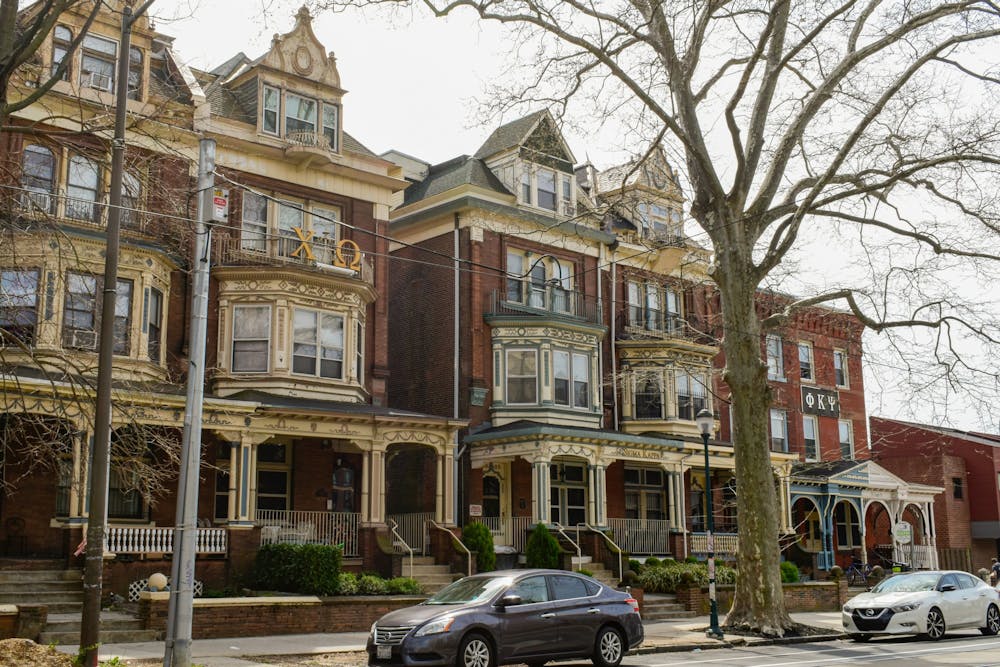
Fraternity houses on Spruce Street.
Credit: Edwin MejiaIn a recently published article in The Daily Pennsylvanian, columnist Isabella Glassman presented her argument for why Penn should cover the costs of vacancies left in Greek life chapter houses due to the implementation of the Second Year Experience Program, which requires all sophomores to live on campus. But my question is this: Why should I care? Don’t get me wrong — Penn’s decision to require second-year students to live on campus is a "blatant cash grab" and has unfairly burdened Greek life, whose members must now scramble to fill rooms traditionally used to house sophomores. But for a school where roughly 75% of students aren’t a part of Greek life, why should our tuition dollars pay the rent for these multi-million dollar party houses?
Many of these fraternity houses are located in highly coveted locations in the middle of campus on Locust Walk. Asking Penn to use tuition dollars to pay for these fraternity mansions that a lot of us can’t even get into is ridiculous. With demand among Penn students for better dining options and an increase in on-campus cultural spaces, funneling money into keeping up fraternities' exclusive, jungle juice-fueled basement ragers is not high on the Penn student body’s list of priorities. If these fraternity students don’t want to live in these centrally located houses, reappropriate them into spaces for students who actually want to use them. Turn these Locust Walk fraternity houses into department buildings, cultural houses, or student buildings with study spaces, group study rooms, or simply lounges for all students to enjoy. If Penn really wants to build community, give us spaces to do so.
The idea to reappropriate the Locust Walk fraternity houses into spaces for the entirety of the student body to use is nothing new. The Coalition Against Fraternity Sexual Assault, or CASFA, has been calling for an end to Greek life’s presence on Locust for years. The group cites Penn fraternities’ long history of racism, hazing, and sexual assault as their reasoning to turn the Locust Walk chapter houses into cultural and wellness centers. CASFA’s concern over sexual assault within fraternities is well-justified, as revealed by Penn’s participation in the 2019 AAU Campus Climate Survey. The survey reported that 13% of students had experienced sexual assault sometime during their time at university, and that number has been rising among all gender identities since 2015. The AAU also found that over 20% of such incidents took place within a fraternity house. Why should student tuition dollars go to funding spaces known to harbor sexual misconduct?
Additionally, support for the end of fraternity culture within the Penn student body has been increasing. Violence in Penn Greek life has made headlines in recent months following the assault of a student at a Castle party last year at the hands of a brother. Students were furious, holding a weeklong demonstration outside of the Castle chapter house and hanging more than 300 flyers around campus demanding the end of “frat culture.” A petition was even drafted to evict Castle from campus, which has amassed almost 6,000 signatures as of publication. Despite this, and the subsequent University's investigation into the incident, the fraternity has faced no visible repercussions. What does it say about our institution if it allows these organizations in the heart of our University’s campus to go virtually unpunished?
However, the reality of the situation is that the financial burden caused by Penn is falling primarily on Greek life students in the form of increasing annual dues. But there is another solution to this problem: downsizing. If fraternities can’t fill their giant houses, why not move to a smaller one? Asking Penn to finance these virtually empty, gorgeous houses in prime locations is frivolous, and considering that this call comes during the midst of the movement to save West Philly townhomes from "Penntrification," it comes off as a little tone-deaf. Underutilizing existing University buildings (such as fraternity houses) directly contributes to Penn’s eagerness to expand into other parts of West Philadelphia. Penn fraternities can move to more affordable and appropriately-sized accommodations, freeing up their Locust houses to be used by the entirety of the Penn community, not just a select few.
The only reasonable solution for Penn to protect these Greek life chapter houses would be to once again allow sophomores to live in them. But, as this best-case scenario most likely will not come to fruition, the responsibility to keep these chapter houses financially afloat should not fall on the wider Penn community. The fact of the matter is that Greek life has been on the decline nationally for years, and Greek life institutions as a whole tend to cater to students who come from higher socioeconomic backgrounds. If Penn Greek life is unable to fill their million-dollar party mansions, my only response is this: Let them drink jungle juice.
JACK NYCZ is a College sophomore studying English and cinema studies from Bucks County, Pa. His email is jacknycz@sas.upenn.edu.
The Daily Pennsylvanian is an independent, student-run newspaper. Please consider making a donation to support the coverage that shapes the University. Your generosity ensures a future of strong journalism at Penn.
Donate



